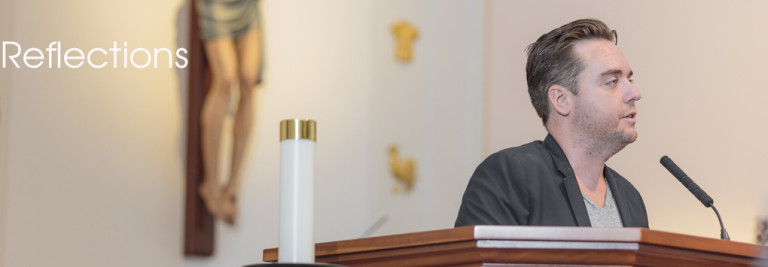“True love is your soul’s recognition of its counterpoint in another,” goes the old saw and, like so many platitudes, it is at once tiresome and striking. Certainly, that seems to be with Adam in our first reading, when awakening early one morning to find his complete equal standing before him.
Having myself fallen quite inexplicably and completely romantically in love, I too have felt that revelatory awe of Adam upon seeing Eve. “This is flesh of my flesh, bone of my bone” (Genesis 2:23) he exclaims. This recognition, like all modern meanings of love, has so often been interpreted to only mean romantic love or Eros. Pushed away is what Adam also must be feeling – namely, the recognition that is also emotional, vocational and deeply spiritual.
The feeling of recognition isn’t always immediate, but finding one’s true love, whether it is a romantic partnership, a priestly calling, or a creative profession, takes deep spiritual reflection and a desire to serve – often the people we find difficult to be around.
Sometimes the soul’s recognition of her vocation comes gradually and other times more dramatically, but one thing is for sure: we need each other. No matter your call in life, the examples are abundant: the writer needs readers; the clergy need laity; the clay, a sculptor. In this periscope the ancients seem to be telling us that we’re not quite human if we are not serving one another; we need each other.
Phyllis Trible calls God “the evaluator and the rectifier” in the story (God and the Rhetoric of Sexuality, 89). Rev. Dr. Sara Koenig, a Presbyterian minister and Associate Professor of Biblical Studies writes: “God is the evaluator, assessing the created world. Surprisingly, amidst all the goodness of creation in the previous chapter, God evaluates as not good that the human should be alone.” (Genesis Reflections, 34). Our story begins in loneliness and ends in deep loving companionship.
True love, as theologian Christopher West tells us, must be “free, full, faithful and fruitful” (Fill These Hearts: God, Sex and the Universal Longing, 90) – colloquially, the Four F’s. Through this lens we realize that true love has almost nothing to do with roses or cards or the color red, but everything to do with service: full, free, faithful and fruitful service to one another. Let’s not pretend this first reading doesn’t come with historic difficulties.
Women have very real and authentic concerns with their Church (as many people do), often stemming from one-sided theological interpretations. What strikes me, praying over these scriptures, is that inequality among men and women and, therefore, all of humanity isn’t introduced until sin enters into the story. “The woman whom You gave to be with me, she gave me from the tree, and I ate” (Genesis 3:12) is Adam’s poor excuse when confronting God. Sound familiar? It does if you know me; I always look to blame others when I’m wrong!
The too human and often male frailty of not admitting weakness! I think Adam’s true sin is not that he didn’t love in that moment of weakness, but that he didn’t serve his equal. Have a wonderful week.
I’ll be seeing you,
Elliot



